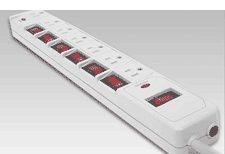

AC power surge protectors have been a very popular form of protection for consumer-grade home theater systemsfor decades now. Dealers love to sell them as "attach" items onto an entire audio or home theater system. They have the ability to add extra AC outlets and provide a limited amount of protection via some form of fuse or MOV, which will trip if a voltage surge hits an AC system. Dangerously, these fuses only live once, yet most surge "protectors" keep working once the fuse of MOV has been tripped, leaving the system fully exposed to the next AC power surge.
The Bus Strip
The bus strip is the most entry-level solution, as it is basically a glorified extension cord, with upwards of six outlets and sometimes a very modest fuse. This solution is more for convenience than performance improvement or system protection.
Surge Protection Components
Rack-mountable products offer more features and more serious protection via better fuses and more serious MOV devices. These units can cost many times more than a bus strip and often include basic filtering of AC noise from the line, which can possibly improve performance. More sophisticated units have digital LCD screens, which allow for the consumer to monitor the AC power draw from the wall.
The most sophisticated AC power surge protectors cost thousands of dollars and are built to military specifications, some weighing over 100 pounds per component. Many of these more robust solutions use MOVs that are incredibly heavy-duty and can take a more direct hit to a system, because to make these MOVs fail, a system would need to suffer the type of hit that comes from a lightning hit or a nearby exploding transformer. Many of the more robust solutions come with insurance polices that protect clients for over $100,000 in system value. Other companies in this uber-category of AC power for home theater boast 100 percent field success results, meaning that no unit has ever failed in an installation.
Battery Backup
Another popular option for the protected home theater is a battery backup, also called a UPS (Uninterruptible Power Supply). With power failures on aging AC power grids, home theater enthusiasts are looking for ways to find solutions that protect their huge investments when the power unexpectedly goes out. One of the newest concepts is the idea of adding battery backup to give the consumer a significant buffer to be able to shut his or her system down in a time of AC trouble until the DWP can get the power going again. For theaters with lamp-based projection systems or anything with a hard drive (DVR, game system, etc), battery backups are highly recommended.
Computer Battery Backup Devices for Home Theater
The most cost-effective solution for the entry-level home theater enthusiast is to use a consumer-grade battery backup system, which is sold at computer stores and big-box retailers. For about $100, these often odd-shaped units provide power to run various components from anywhere from five to 15 minutes without shutting off abruptly, thereby avoiding potential damage.
Audiophile-Grade Battery Backup
With single components costing $1,000 to upwards of $5,000, audiophile-grade battery backup for AV gear is the best way to go for the high-end system. Often, the battery backup devices use computers to recreate the AC signal and can digitally filter out noise, though the benefits of this is highly debated. They also offer long and significant power supplies, even for power-hungry reference home theater systems when the lights go out.
Projector Issues Require Battery Backup
Today's digital video projectors run very hot and require fans to keep their increasingly bright bulbs at the correct operating temperature. If your system loses power in the middle of a long session with the projector on, you will want battery backup to keep the fan running. Without this contingency, it is possible to damage the bulb's performance and/or ruin the bulb and its associated electronics, causing the need for a repair that could cost from $500 to many thousands of dollars.
Popular brands for AC Power and Battery backups include APC, Richard Gray's Power Company, and PurePower.
Home Theater Review's power product reviews include:
APC S Type AV Power Conditioner with Battery Backup
Richard Gray's Power Company RGPC 400 Pro